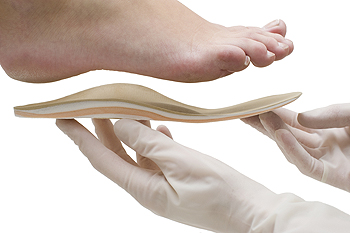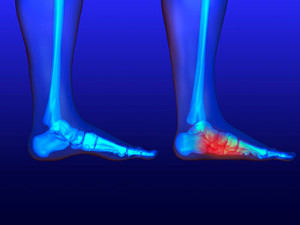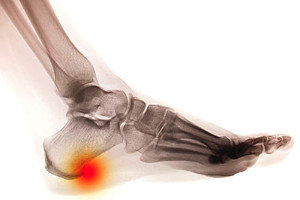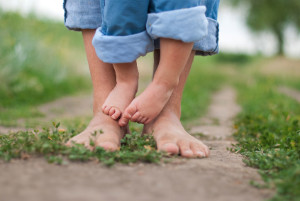Items filtered by date: September 2019
Three Types of Orthotics
 A specific type of insole that is worn in the shoe is referred to as an orthotic. It is helpful in providing adequate support and cushioning that may be needed for certain foot conditions. There are known to be three types of orthotics. Soft orthotics can add extra cushioning and may be helpful to athletes who frequently jump during sporting activities. Patients who have flat feet may find that wearing semi-rigid insoles can help to add stability while performing daily functions. Rigid orthotics may be recommended to patients who have limited control over their feet, which may be a result of a neurological illness. If you have any questions about these types of insoles, it is suggested that you consult with a podiatrist who can provide you with orthotics that are right for you.
A specific type of insole that is worn in the shoe is referred to as an orthotic. It is helpful in providing adequate support and cushioning that may be needed for certain foot conditions. There are known to be three types of orthotics. Soft orthotics can add extra cushioning and may be helpful to athletes who frequently jump during sporting activities. Patients who have flat feet may find that wearing semi-rigid insoles can help to add stability while performing daily functions. Rigid orthotics may be recommended to patients who have limited control over their feet, which may be a result of a neurological illness. If you have any questions about these types of insoles, it is suggested that you consult with a podiatrist who can provide you with orthotics that are right for you.
If you are having discomfort in your feet and would like to try orthotics, contact Dr. Odin De Los Reyes from Connecticut. Our doctor can provide the care you need to keep you pain-free and on your feet.
What Are Orthotics?
Orthotics are inserts you can place into your shoes to help with a variety of foot problems such as flat feet or foot pain. Orthotics provide relief and comfort for minor foot and heel pain but can’t correct serious biomechanical problems in your feet.
Over-the-Counter Inserts
Orthotics come in a wide variety of over-the-counter inserts that are used to treat foot pain, heel pain, and minor problems. For example, arch supports can be inserted into your shoes to help correct overarched or flat feet, while gel insoles are often used because they provide comfort and relief from foot and heel pain by alleviating pressure.
Prescription Orthotics
If over-the-counter inserts don’t work for you or if you have a more severe foot concern, it is possible to have your podiatrist prescribe custom orthotics. These high-quality inserts are designed to treat problems such as abnormal motion, plantar fasciitis, and severe forms of heel pain. They can even be used to help patients suffering from diabetes by treating foot ulcers and painful calluses and are usually molded to your feet individually, which allows them to provide full support and comfort.
If you are experiencing minor to severe foot or heel pain, it’s recommended to speak with your podiatrist about the possibilities of using orthotics. A podiatrist can determine which type of orthotic is right for you and allow you to take the first steps towards being pain-free.
If you have any questions please contact our offices located in Southbury and Farmington, CT . We offer the newest diagnostic and treatment technologies for all your foot and ankle needs.
Do Your Child's Feet Hurt?
How to Take Care of Children’s Feet
The importance of properly taking care of your child’s feet is crucial in possibly preventing certain foot conditions from developing. Children’s feet may be sweaty for the majority of the day, and it is important to wash and dry them on a daily basis. This may prevent athlete’s foot from occurring. Research has indicated that children's feet may become stronger when they can walk barefoot while indoors. This can be a result of the grasping motion that occurs when the toes touch the floor. Ingrown toenails may be prevented when the toenails are cut frequently and in a straight line. Additionally, when it is time for your child to walk outside, it is helpful to purchase shoes that fit properly. This can be accomplished by measuring your child’s foot to determine the correct shoe size. If you would like more information about how to take care of your child’s feet, it is suggested that you speak with a podiatrist.
Making sure that your children maintain good foot health is very important as they grow. If you have any questions, contact Dr. Odin De Los Reyes of Connecticut. Our doctor can provide the care you need to keep you pain-free and on your feet.
Keeping Children's Feet Healthy
Having healthy feet during childhood can help prevent medical problems later in life, namely in the back and legs. As children grow, their feet require different types of care. Here are some things to consider...
Although babies do not walk yet, it is still very important to take care of their feet.
Avoid putting tight shoes or socks on his or her feet.
Allow the baby to stretch and kick his or her feet to feel comfortable.
As a toddler, kids are now on the move and begin to develop differently. At this age, toddlers are getting a feel for walking, so don’t be alarmed if your toddler is unsteady or ‘walks funny’.
As your child gets older, it is important to teach them how to take care of their feet.
Show them proper hygiene to prevent infections such as fungus.
Be watchful for any pain or injury.
Have all injuries checked by a doctor as soon as possible.
Comfortable, protective shoes should always be worn, especially at play.
If you have any questions please feel free to contact our offices located in Southbury and Farmington, CT . We offer the newest diagnostic and treatment technologies for all your foot and ankle needs.
Is Being Overweight Detrimental to the Health of the Feet?
 Patients who are overweight may notice they frequently experience foot pain. This can be a result of the added weight the feet must endure on a daily basis. Additionally, there are uncomfortable foot conditions that may develop which can include plantar fasciitis, arthritis, and tendinitis. These can compromise the ability to complete daily activities. Obese patients may have flat feet, and this may produce considerable pain and discomfort. Other medical conditions that can develop from being overweight are gout, diabetes, and circulation ailments. If you have questions about how obesity can affect the feet, it is strongly advised that you seek the counsel of a podiatrist.
Patients who are overweight may notice they frequently experience foot pain. This can be a result of the added weight the feet must endure on a daily basis. Additionally, there are uncomfortable foot conditions that may develop which can include plantar fasciitis, arthritis, and tendinitis. These can compromise the ability to complete daily activities. Obese patients may have flat feet, and this may produce considerable pain and discomfort. Other medical conditions that can develop from being overweight are gout, diabetes, and circulation ailments. If you have questions about how obesity can affect the feet, it is strongly advised that you seek the counsel of a podiatrist.
Obesity has become very problematic at this point in time and can have extremely negative effects on the feet. If you’re an obese individual and are concerned about your feet, contact Dr. Odin De Los Reyes from Connecticut. Our doctor can provide the care you need to keep you pain-free and on your feet.
Obesity and Your Feet
Since your feet are what support your entire weight when standing, any additional weight can result in pain and swelling. Being overweight is one of the main contributors to foot complications.
Problems & Complications
Extra Weight – Even putting on just a few extra pounds could create serious complications for your feet. As your weight increases, your balance and body will shift, creating new stresses on your feet. This uneven weight distribution can cause pain, even while doing the simplest tasks, such as walking.
Diabetes – People who are overweight are at serious risk of developing type-2 diabetes, which has a drastic impact on the health of your feet. As you get older, your diabetes might worsen, which could lead to loss of feeling in your feet, sores, and bruises. You could also become more prone to various infections.
Plantar fasciitis – Pressure and stress that is placed on muscles, joints, and tendons can trigger plantar fasciitis, which is an inflammation of tissue that forms along the bottom of the foot.
If you have any questions please feel free to contact our offices located in Southbury and Farmington, CT . We offer the newest diagnostic and treatment technologies for all your foot and ankle needs.
Possible Causes of Flat Feet
 The medical term that is referred to as “pes planus” is more commonly known as flat feet. It essentially means the feet have little or no arch, and this may contribute to an overall feeling of tiredness in the feet. Genetic factors may play a significant role in the development of flat feet, in addition to wearing shoes which may include high heels that can limit toe movement. Moderate relief can be found when gentle stretching techniques are frequently performed, and this may also help to strengthen the Achilles tendon. This may be instrumental in elongating the calf muscles which can be linked to helping flat feet. If you are experiencing foot pain as a result of having flat feet, it is advised that you consult with a podiatrist who may recommend custom made orthotics that may help to provide relief.
The medical term that is referred to as “pes planus” is more commonly known as flat feet. It essentially means the feet have little or no arch, and this may contribute to an overall feeling of tiredness in the feet. Genetic factors may play a significant role in the development of flat feet, in addition to wearing shoes which may include high heels that can limit toe movement. Moderate relief can be found when gentle stretching techniques are frequently performed, and this may also help to strengthen the Achilles tendon. This may be instrumental in elongating the calf muscles which can be linked to helping flat feet. If you are experiencing foot pain as a result of having flat feet, it is advised that you consult with a podiatrist who may recommend custom made orthotics that may help to provide relief.
Flatfoot is a condition many people suffer from. If you have flat feet, contact Dr. Odin De Los Reyes from Connecticut. Our doctor will treat your foot and ankle needs.
What Are Flat Feet?
Flatfoot is a condition in which the arch of the foot is depressed and the sole of the foot is almost completely in contact with the ground. About 20-30% of the population generally has flat feet because their arches never formed during growth.
Conditions & Problems:
Having flat feet makes it difficult to run or walk because of the stress placed on the ankles.
Alignment – The general alignment of your legs can be disrupted, because the ankles move inward which can cause major discomfort.
Knees – If you have complications with your knees, flat feet can be a contributor to arthritis in that area.
Symptoms
- Pain around the heel or arch area
- Trouble standing on the tip toe
- Swelling around the inside of the ankle
- Flat look to one or both feet
- Having your shoes feel uneven when worn
Treatment
If you are experiencing pain and stress on the foot you may weaken the posterior tibial tendon, which runs around the inside of the ankle.
If you have any questions please feel free to contact our offices located in Southbury and Farmington, CT . We offer the newest diagnostic and treatment technologies for all your foot and ankle needs.
What Causes Heel Spurs?
 The condition that is known as a heel spur can cause pain and discomfort. It happens as a result of a calcium deposit that forms between the arch and the heel of the foot. The symptoms that are often associated with this condition can include difficulty in walking barefoot, pain in the heel and surrounding areas, and swelling and inflammation. It can develop with muscle and ligament tension, which may cause the soft tissues to wear out. People who frequently participate in sporting activities that involve running and jumping may be prone to developing heel spurs. It is beneficial to wear shoes that have adequate cushioning in the heel area, in addition to resting and elevating the foot as often as possible. If you have developed a heel spur, it is advised that you speak to a podiatrist who can recommend treatment options that are correct for you.
The condition that is known as a heel spur can cause pain and discomfort. It happens as a result of a calcium deposit that forms between the arch and the heel of the foot. The symptoms that are often associated with this condition can include difficulty in walking barefoot, pain in the heel and surrounding areas, and swelling and inflammation. It can develop with muscle and ligament tension, which may cause the soft tissues to wear out. People who frequently participate in sporting activities that involve running and jumping may be prone to developing heel spurs. It is beneficial to wear shoes that have adequate cushioning in the heel area, in addition to resting and elevating the foot as often as possible. If you have developed a heel spur, it is advised that you speak to a podiatrist who can recommend treatment options that are correct for you.
Heel spurs can be incredibly painful and sometimes may make you unable to participate in physical activities. To get medical care for your heel spurs, contact Dr. Odin De Los Reyes from Connecticut. Our doctor will do everything possible to treat your condition.
Heels Spurs
Heel spurs are formed by calcium deposits on the back of the foot where the heel is. This can also be caused by small fragments of bone breaking off one section of the foot, attaching onto the back of the foot. Heel spurs can also be bone growth on the back of the foot and may grow in the direction of the arch of the foot.
Older individuals usually suffer from heel spurs and pain sometimes intensifies with age. One of the main condition's spurs are related to is plantar fasciitis.
Pain
The pain associated with spurs is often because of weight placed on the feet. When someone is walking, their entire weight is concentrated on the feet. Bone spurs then have the tendency to affect other bones and tissues around the foot. As the pain continues, the feet will become tender and sensitive over time.
Treatments
There are many ways to treat heel spurs. If one is suffering from heel spurs in conjunction with pain, there are several methods for healing. Medication, surgery, and herbal care are some options.
If you have any questions feel free to contact our offices located in Southbury and Farmington, CT . We offer the latest in diagnostic and treatment technology to meet your needs.


